Featuring grand cobblestoned squares lined with exuberant Baroque buildings, Lille is one of France’s best-kept secrets. And thanks to its excellent rail connections, it is easy to take a day trip to Lille from other major cities, including London on Eurostar.
But which are the best things to see in Lille? As a three-time visitor, this is where I can help.
Make the most of your time in this fascinating Flemish city by following my 1-day Lille itinerary. There’s a map you can use for a self-guided walking tour and practical information, including where to stay, how to get there and how to get around.
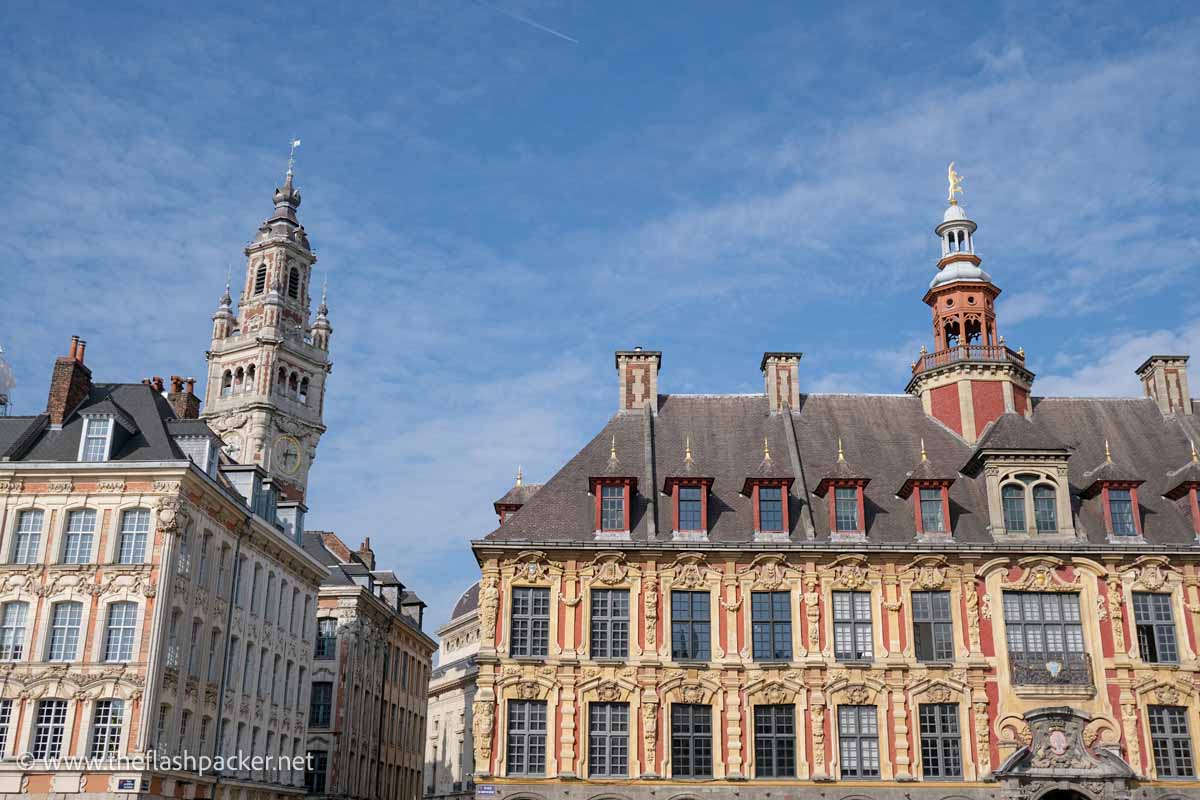
Some articles on this website contain affiliate links. This means that I may earn a small commission if you make a purchase through these links. As an Amazon Associate, I earn from qualifying purchases. Read the full disclosure here.
Is One Day in Lille Enough?
One day is enough to cover Lille’s main sights. Despite its size, the city’s main attractions are close together, making it easy to explore on foot.
However, I recommend spending two days in Lille to appreciate it at a more relaxed pace. This also means that you can visit Lille Citadel and the extraordinary La Piscine de Roubaix.
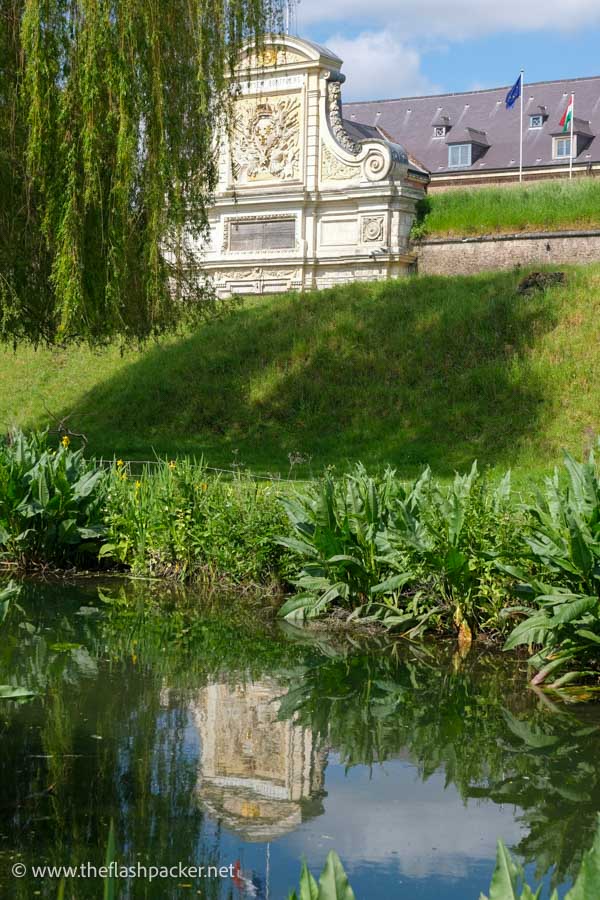
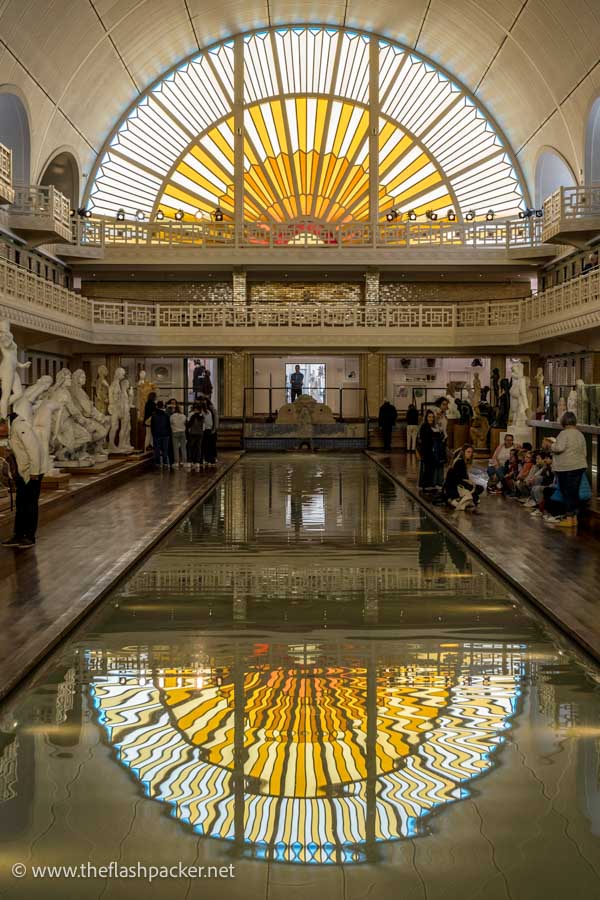
Suggested 1-Day Lille Itinerary + Map
My day in Lille starts at Musée de Hospice Comtesse and finishes at the Beffroi de Lille.
This itinerary follows a logical route from north to south but you may need to tweak it and dog-leg back to a few places to accommodate their opening hours. Check these in advance. Museums and art galleries in Lille are closed on Tuesdays.
The distance between these sights is less than 2 miles. If you find it helpful, here’s a map you can use as a self-guided Lille walking tour. Click here or on the image for step-by-step directions and to send to your phone.
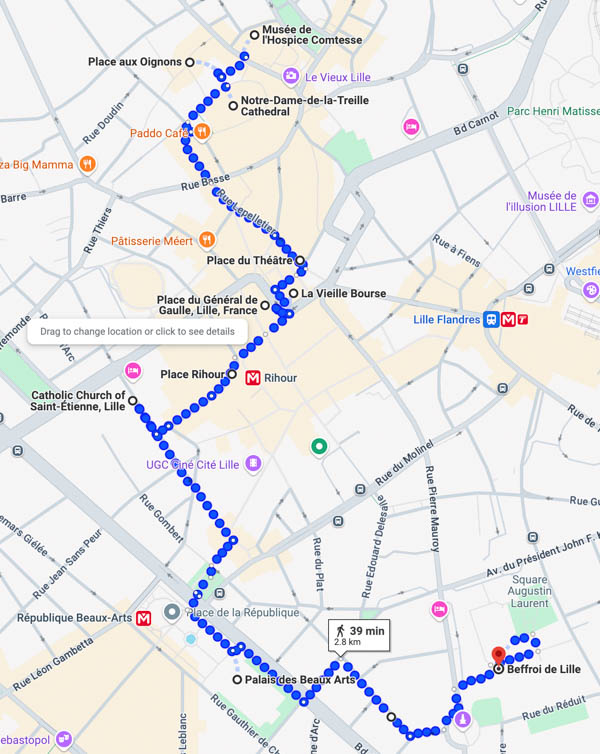
Musée de Hospice Comtesse (Hospice Compesse Museum)
The Hospice Comtesse Museum was founded as a hospital in 1237 by Countess Jeanne de Flandres. It remained in service until 1939 and is now the city’s museum and home to a collection of Flemish paintings, tapestries, wood sculptures and porcelain.
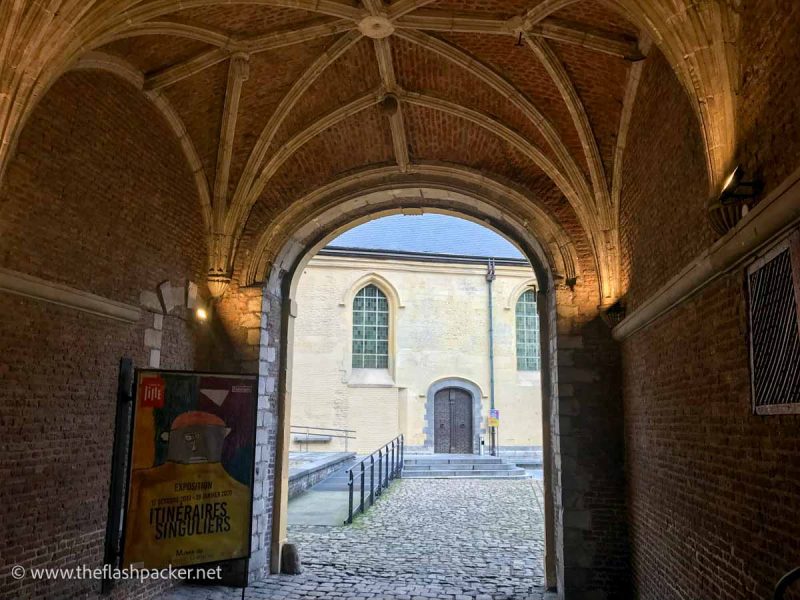
Aux Merveilleux de Fred
No Lille day trip is complete without trying Merveilleux. The best place to pick these up is Aux Merveilleux de Fred and there’s a shop opposite the Hospice Comtesse Museum.
Literally marvellous, these little cakes are made from clouds of light meringue liberally smothered in fresh cream and chocolate shavings.
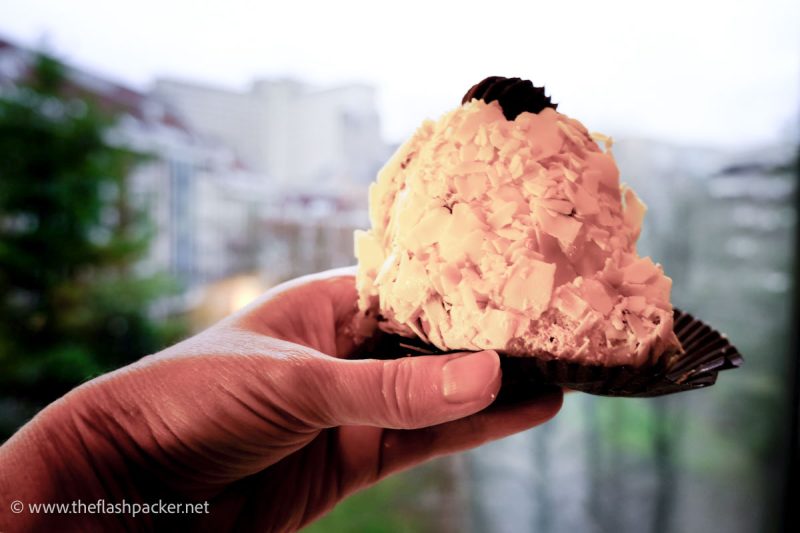
Place aux Oignons
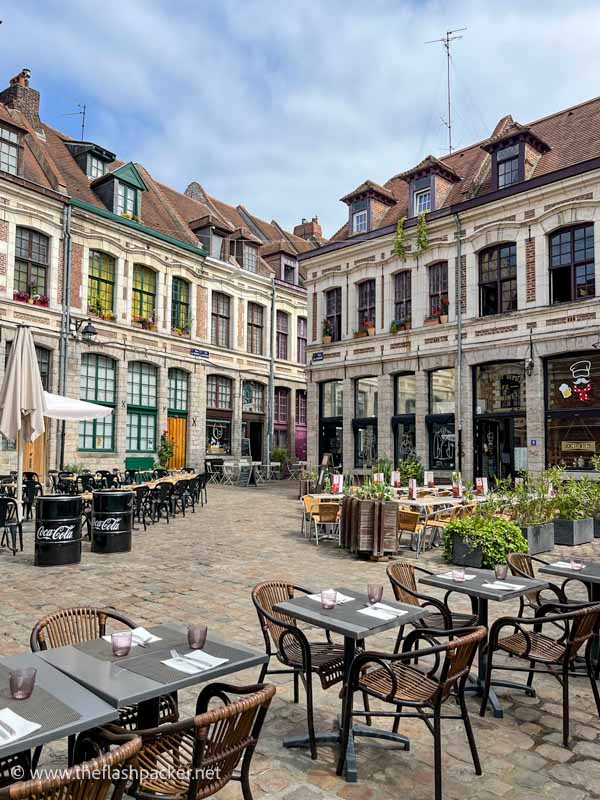
Despite what its name suggests, onions played no part in the history of Place aux Oignons. Back in the Middle Ages, this photogenic square formed part of the fortress of the Counts of Flanders, none of which remains. Today, it is home to several good restaurants.
Notre Dame de la Treille (Lille Cathedral)
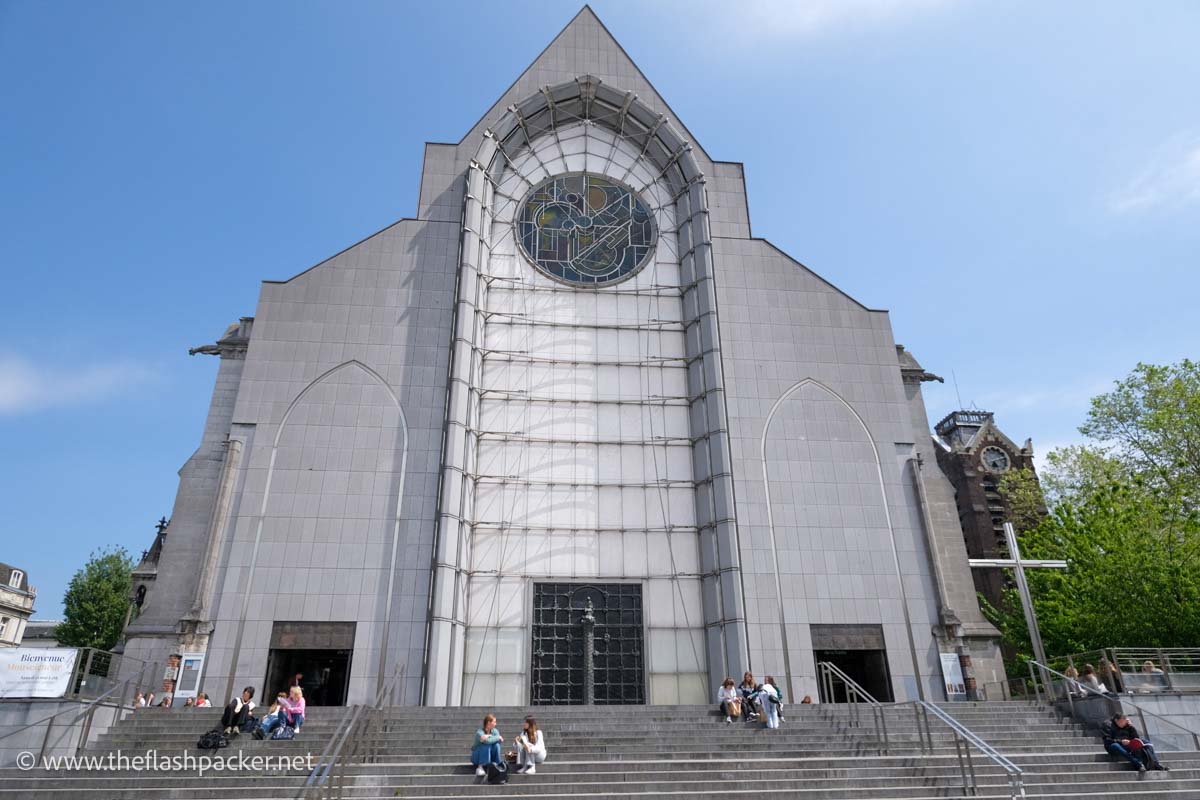
I have walked down the nave of many cathedrals over the years but the Notre Dame de la Treille ranks amongst the most interesting that I have visited.
Lille Cathedral owes its unique appearance to its troubled genesis. Originally conceived as a Gothic building, the cathedral’s foundations were laid in 1854. However, workers had to down tools in 1947 when funds dried up, and construction was not completed until 1999.
The resulting cathedral is a dizzying mix of traditional meets contemporary. The ugly modern façade, made from 110 marble sheets, contrasts with the cathedral’s interior of soaring Gothic arches.
Its glass rose window above the main entrance features unusual symbols including UFOs & astronauts, said to represent the cycle of death and resurrection.
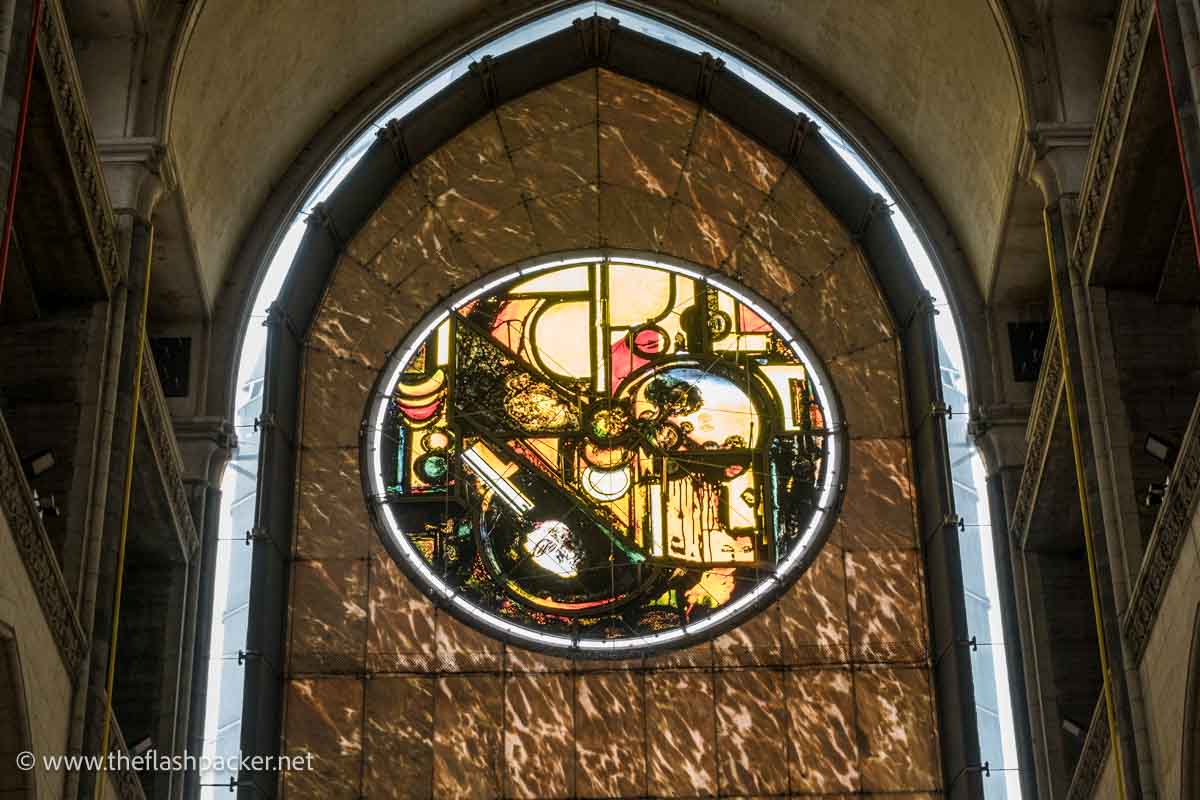
However, for me, Lille Cathedral’s star turn is La Sainte Chapelle behind the main altar. Housing a small 12th-century statue of the Virgin Mary, it has an exquisite mosaic floor.
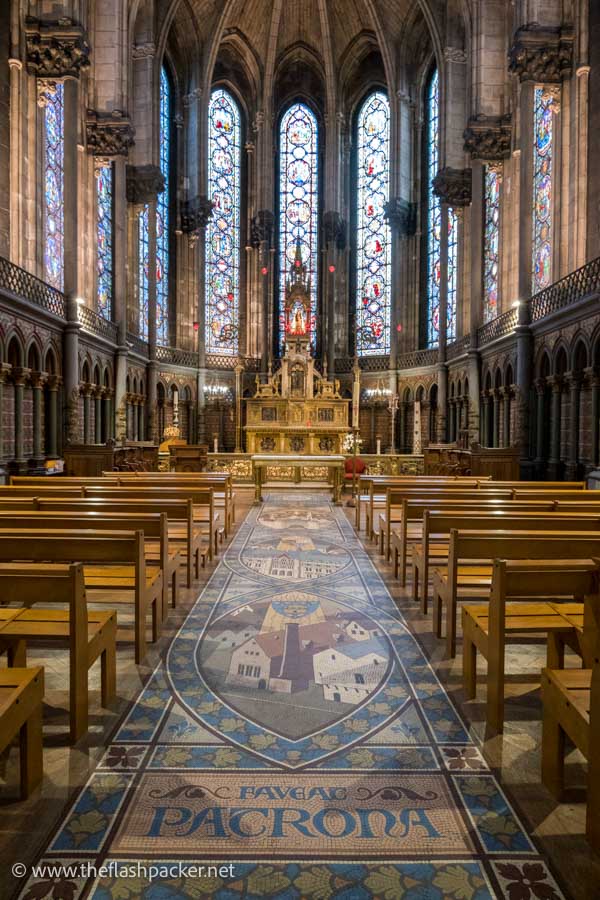
Place de Théâtre & La Veille Bourse
Two flamboyant buildings dominate Lille’s Place du Théâtre.
The first is its gleaming white opera house topped by an overblown sculpture of the Triumph of Apollo.
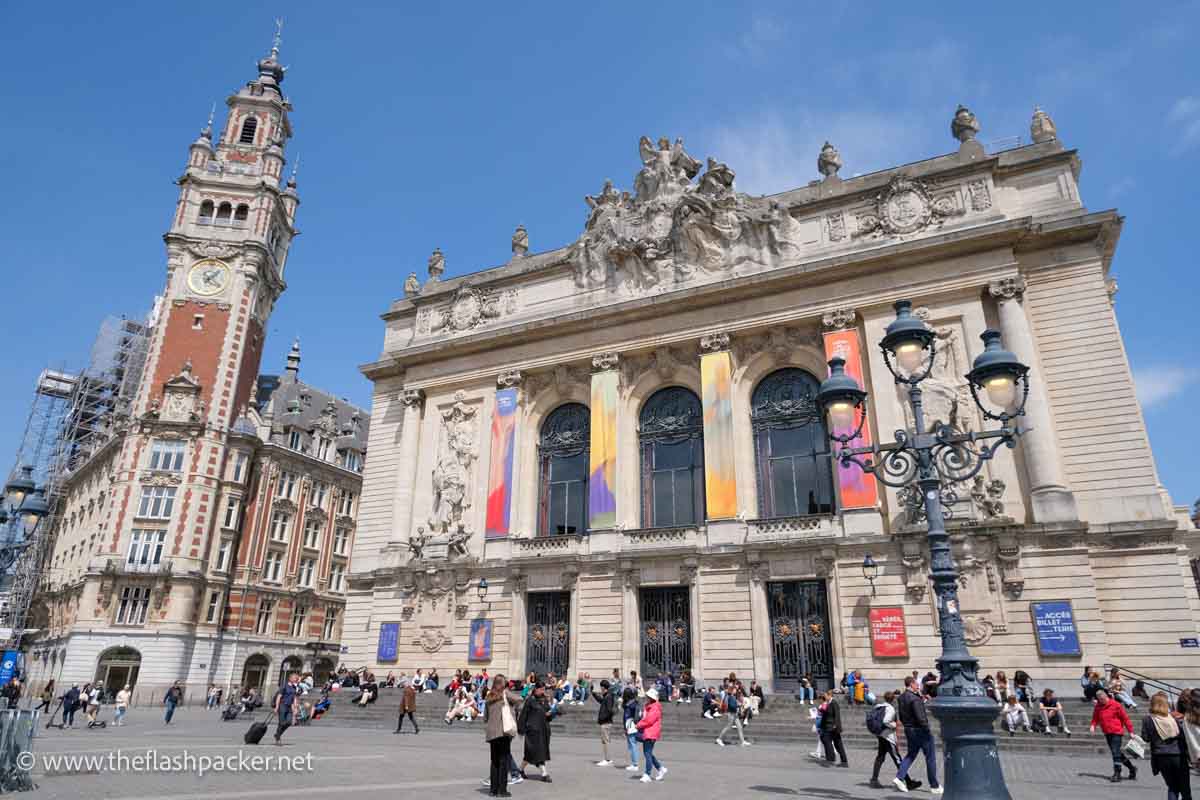
The other is the ornate, albeit more restrained, La Veille Bourse.
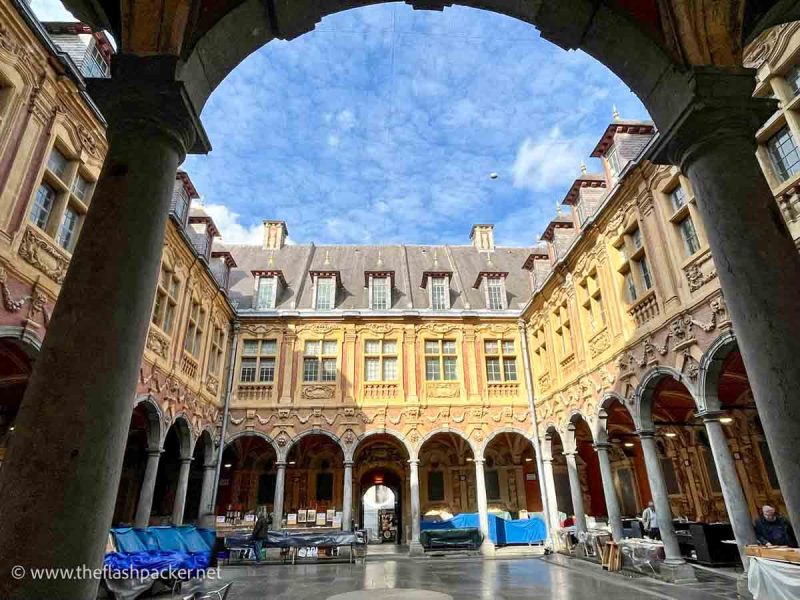
La Veille Bourse was one of my favourite places to visit in Lille. Formerly the city’s stock exchange, this structure comprises 24 small houses arranged around an elaborate, porticoed inner courtyard, embellished with decorative plaques and stone sculptures.
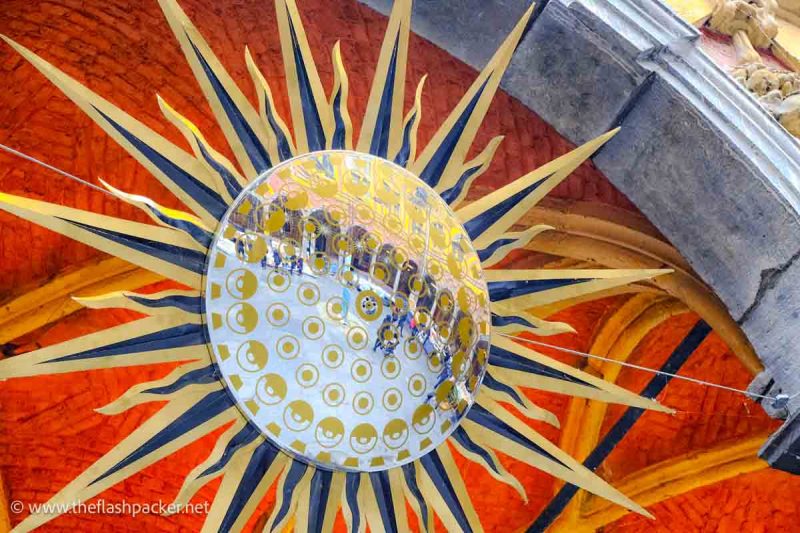
Now home to a book market, La Veille Bourse has an interesting history.
Before its construction in the 1650s, most trading took place outside, and traders were at the mercy of the elements. To prevent the traders from falling sick, La Veille Bourse was commissioned to provide private houses supporting trading in the coldest months.
Place du Générale-de-Gaulle (Grand Place)
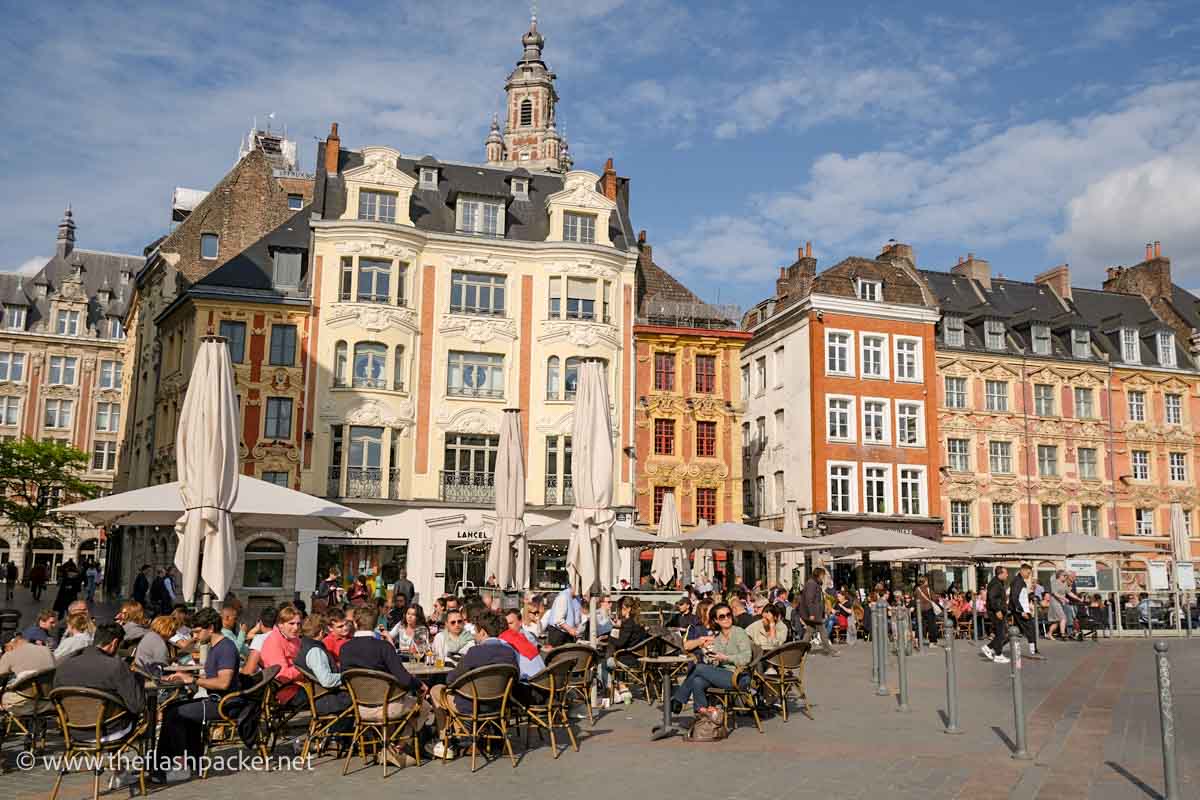
Walk through La Bourse to Lille’s beating heart, the Grand Place. Once the site of the city’s medieval market, today it’s the focal point for celebrations and a popular meeting place.
At Christmas time, it is home to a giant Ferris wheel.
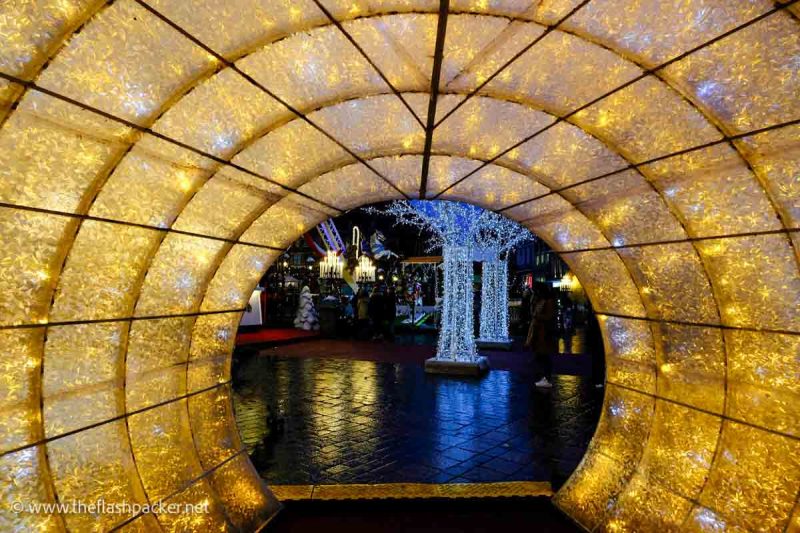
The Déesse Column, commemorating the 1792 Austrian siege, is in the centre of the square.
More exuberant Flemish buildings flank the square, including the La Voix du Nord building, home to the largest newspaper in Northern France.
Climb the steps to the entrance of Théâtre du Nord for a birds-eye view of the Grand Place.
Place Rihour & Lille Christmas market
Lacking the architectural bravado of the Grand Place or Place du Théâtre, the smaller and unremarkable Place Rihour, is home to the friendly Lille Tourist Office and the city’s Christmas market.
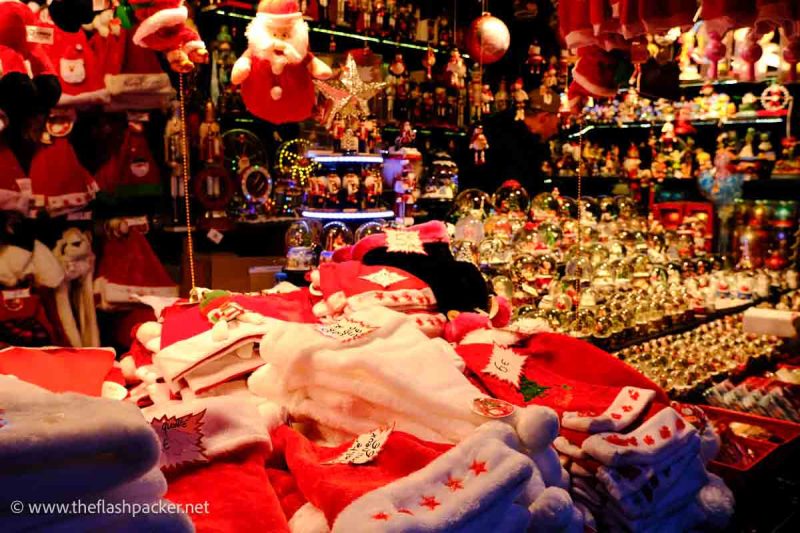
Church of St. Etienne
The 18th-century Church of St. Etienne (L’Église Saint Etienne) is a few minutes walk southwest of Place Rihour.
This is one of France’s largest Jesuit churches and features an exquisite pulpit, sculpted by François Rude. It is crowned by angels and cherubs with Faith and Hope holding a vessel of St. Stephen’s martyrdom.
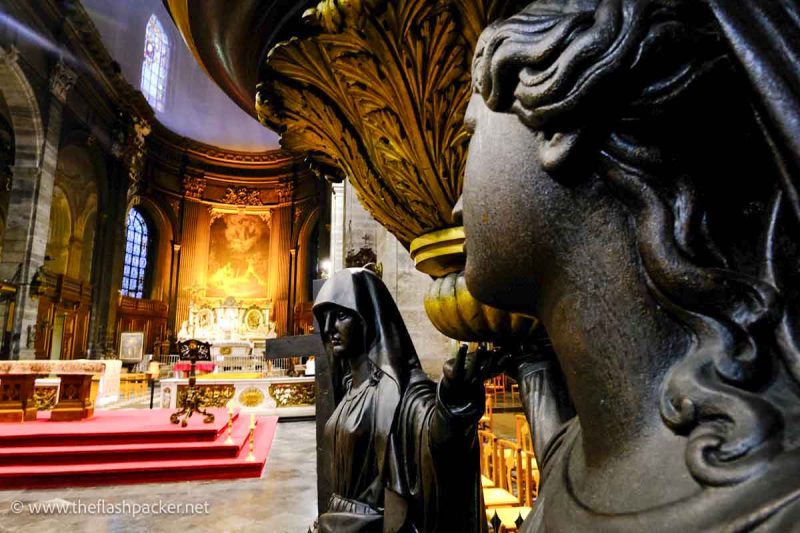
Palais des Beaux-Arts, Lille
Lille’s cultural calling card, the Palais des Beaux-Arts, is ten minutes southeast of the Church of St. Etienne.
Flanking the southern side of the vast Place de la République, this fine art gallery is second only to the Louvre in Paris in size and stature. Napoleon established it in the early 1800s to popularise art, its collection curated from the spoils of war.
I recommend working your way chronologically, starting at the basement level with art from the Renaissance period.
Don’t miss a pair of paintings by Dirk Bouts (1420 – 1475) that were once part of a triptych.
The painting to your right depicts the righteous ascending into Heaven. The souls featured in the left-hand side painting weren’t so lucky, with the dammed falling into Hell to be tortured by demons for eternity.
It is thought that the central painting of this triptych represented Judgement Day.
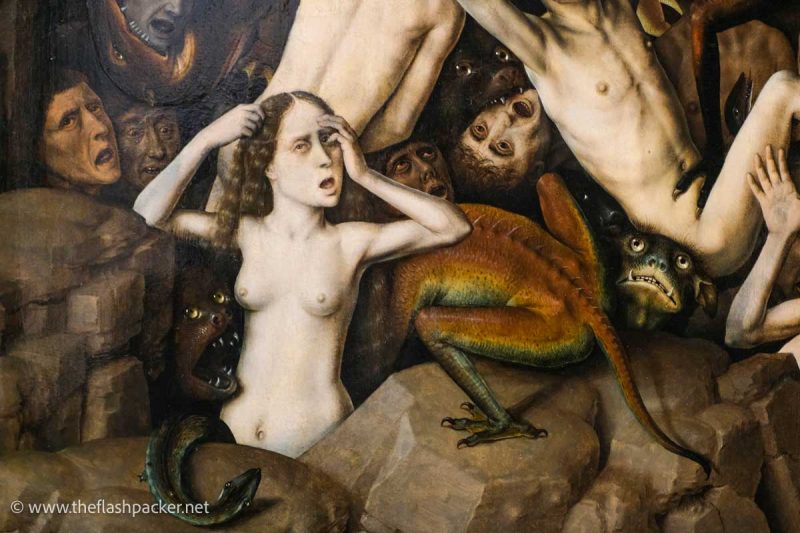
On the upper floor, there is an impressive collection of muscular Rubens, a smattering of Sisleys and expressive Goyas. The Palais des Beaux-Arts is also home to a fine collection of Rodin sculptures, the most striking of which is Les Bourgeois de Calais.
Porte de Paris and Lille Belfry (Beffroi de Lille)
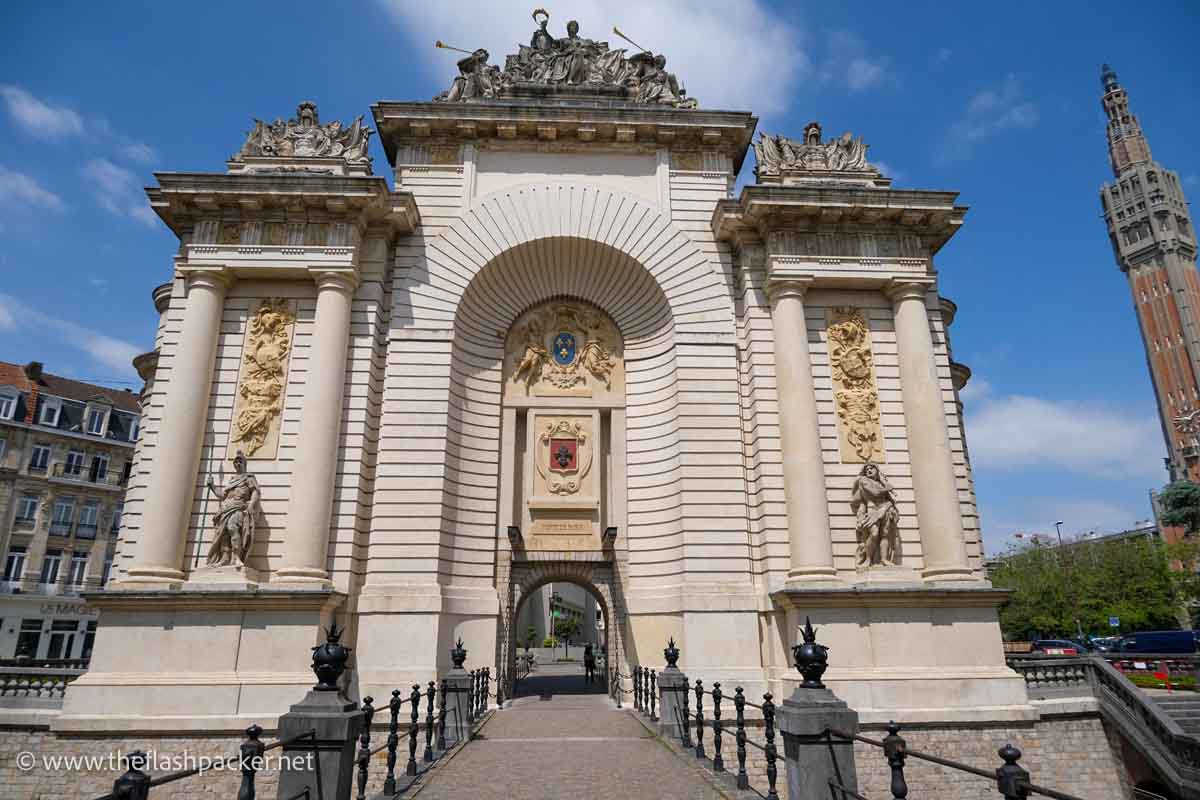
Porte de Paris is five minutes east of the Palais des Beaux-Arts.
Built by Simon Vollant in the late 17th Century to celebrate Louis XIV’s capture of Lille for the French, this is the most striking of Lille’s surviving city gates.
The adjacent red brick and stone Art Deco belfry rises over the city like a giant exclamation mark. At a height of 104 meters, the UNESCO-listed Beffroi de Lille is the highest civilian belfry in Europe.
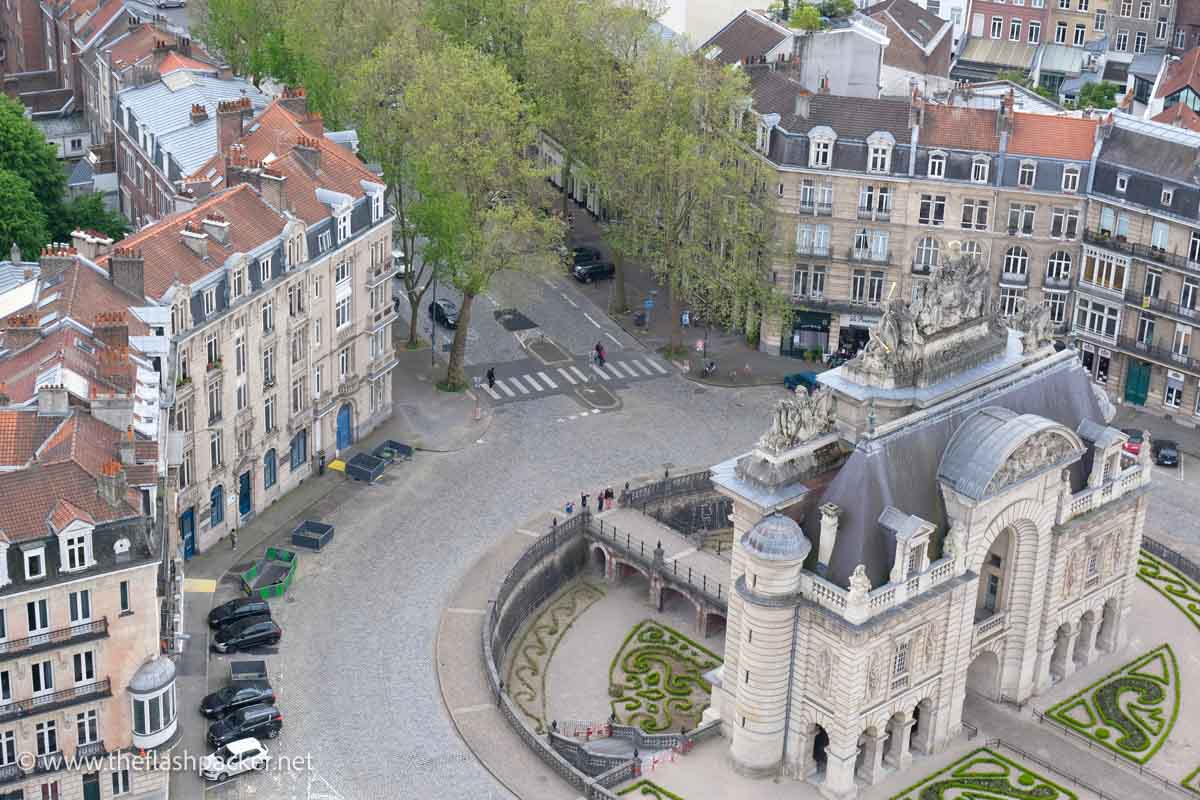
To climb Lille’s belfry, walk the first 100 steps and then take 300 or so steps or the elevator to the top. I recommend taking the lift up and walking down as there is information about the belfry on each floor.
Check opening hours and find out how to book here.
The Best Time to Visit Lille, France
For longer days and the best chance of sunny skies, visit Lille between May and September. I was there most recently in May and basked in balmy temperatures and drank cooling beer under blue skies.
If Christmas markets are your thing, plan your visit for December (this was my first visit). Although it can be cold and damp, there is something magical about the festive lights.
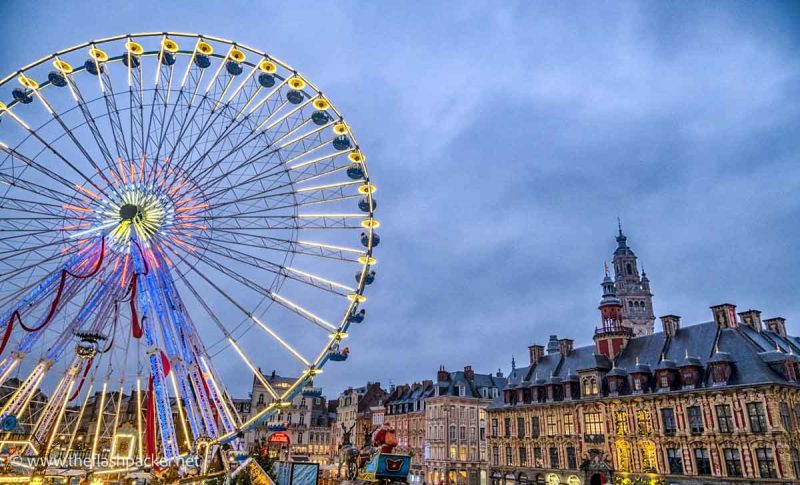
Getting There
BY TRAIN
Lille has two train stations: Lille Flandres and Lille Europe. It is a ten-minute walk between the two train stations.
Most trains from other French cities and Belgium arrive at Lille Flandres station in the heart of the old town. Some TGV services go into Lille Europe, which also serves Eurostar trains from Brussels and London.
Thanks to short journey times and the central location of the train station, it’s easy to do a Lille day trip from Paris, Brussels and London. You can check train times here.
by car
Eurotunnel trains run from Folkestone to Calais up to four times per hour from 7 am. The last train back from Calais is at around midnight. Alternatively, take the car ferry from Dover to Calais, a 90-minute crossing.
There are underground car parks near the old town.
Getting Around
The best way to get around Lille is on foot. As most of the city’s attractions are close to one another, Lille lends itself beautifully to a self-guided walking tour
Lille also has an excellent bus, tram and metro network, which I used to visit La Piscine de Roubaix on my third visit. Public transport is included in the Lille City Pass, which also includes free access to attractions and a selection of discounts and special offers.
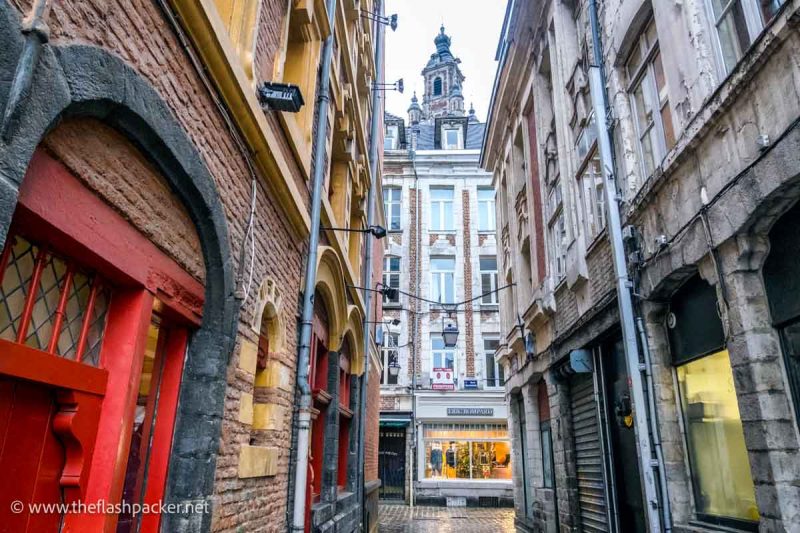
Where to Stay in Lille
As one of France’s biggest cities, Lille does not lack accommodation options. However, to be in the thick of things, pick a central location near the old town.
Ibis Lille Centre Gare
I chose this 3-star hotel on my first visit to Lille for its central location close to Lille Flandres station. It’s perfect if you want a comfortable stay in a good location at an affordable price
Hotel Boa, BW Signature Collection
This 4-star hotel, where I stayed on my most recent trip to Lille, is perfect if you are looking for a quiet, centrally-located hotel with superb customer service. Its location, between Lille Flandres Station and Place de Théâtre, could not be better and the complimentary minibar a bonus.
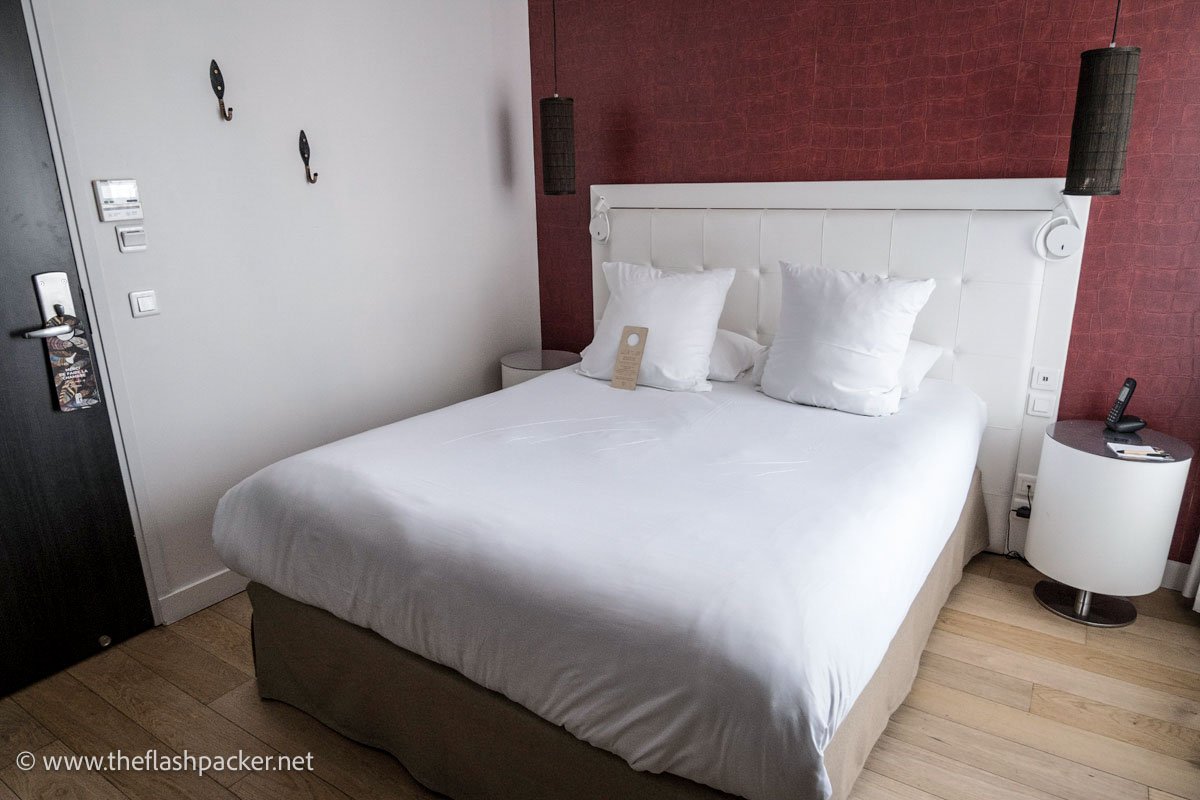
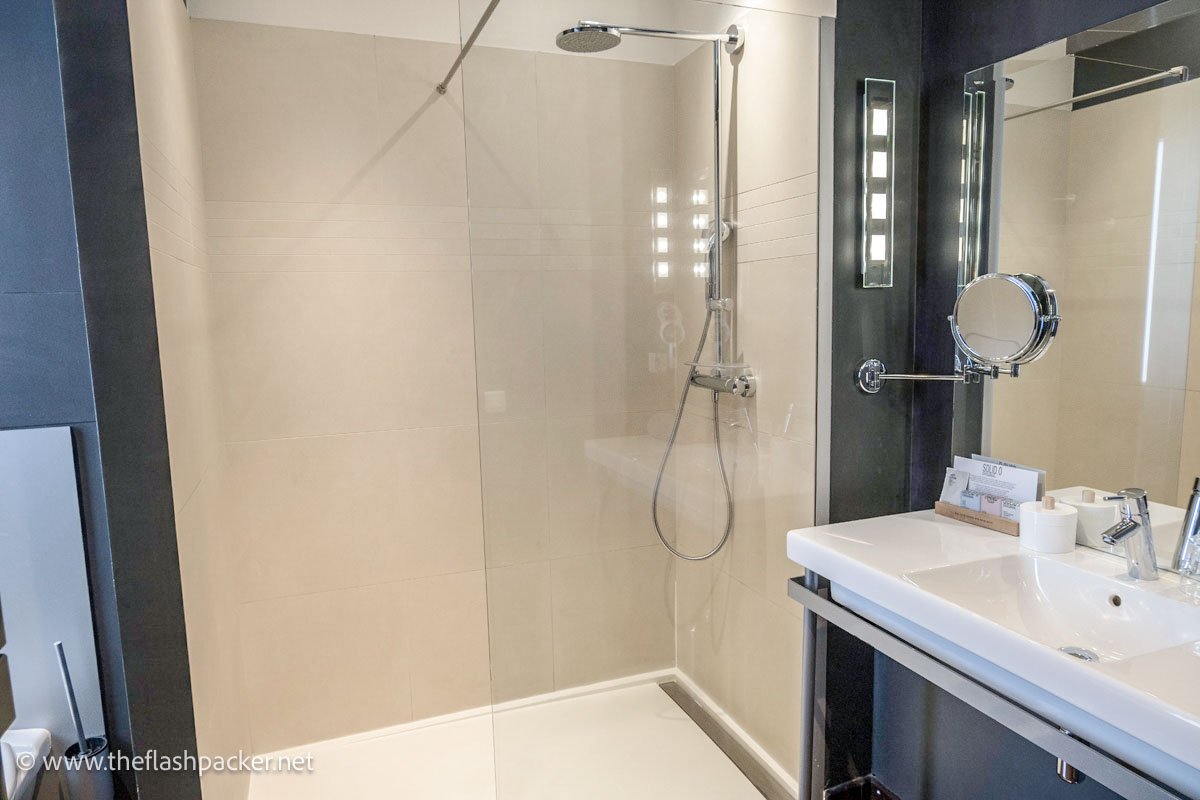
Here are some other hotels that I have found that may suit different budgets:
Splurge – Grand Hotel Bellevue – Grand Place
This 4-star hotel is right in the thick of things on the Grand Place. A good breakfast is included in the room rate.
Budget – Hotel Lille Europe
Close to Lille-Flandres Station, this budget hotel looks terrific value and its helpful staff get a special mention in online reviews.
Thank you for reading my Lille day trip itinerary
On each visit, I have been seduced by Lille’s grandiose Flemish architecture, its old town, the friendliness of its people and its hearty cuisine. For those taking a solo trip to France, it’s relatively safe and easy to explore.
Although Lille may lack the immediate charm of other northern French cities such as Reims, Colmar or Strasbourg, dismiss it at your peril.
Happy travels!
PS. If you’ve found this Lille guide helpful, Pin it to read later!
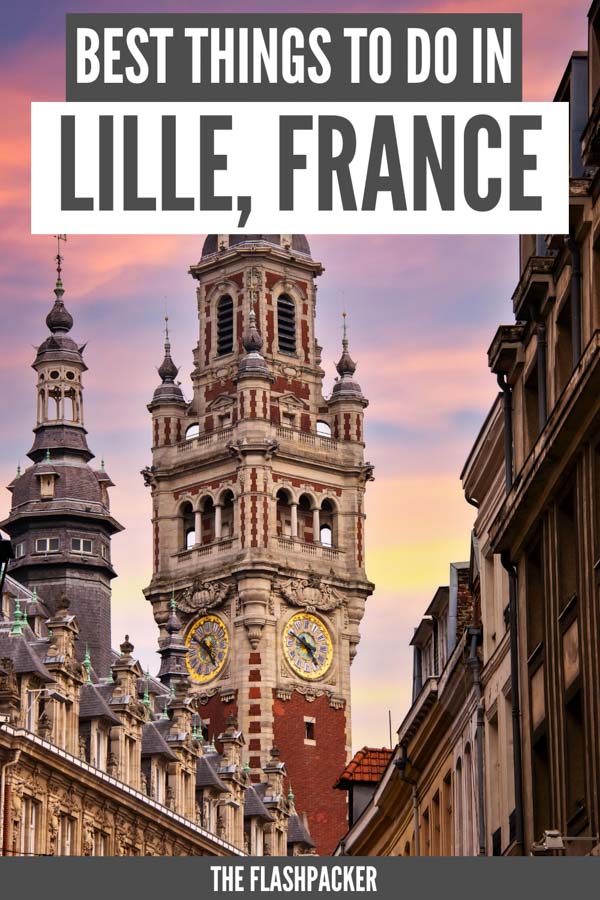
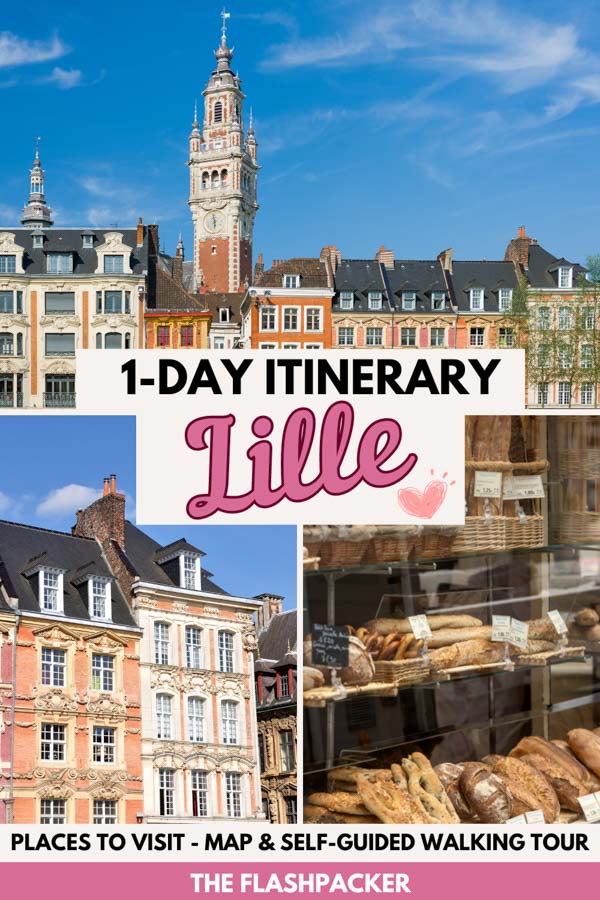

About Bridget
Bridget Coleman has been a passionate traveller for more than 30 years. She has visited 70+ countries, most as a solo traveller.
Articles on this site reflect her first-hand experiences.
To get in touch, email her at hello@theflashpacker.net or follow her on social media.
